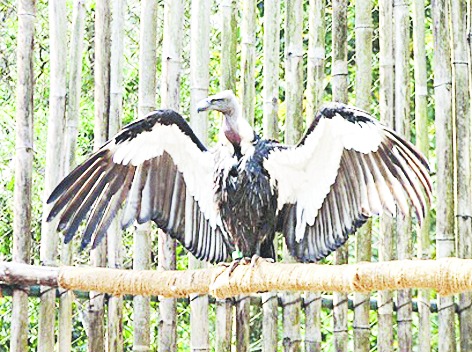New Delhi, Sept. 18: India's environment ministry has requested the health ministry to ban the sale of multiple-dose vials of a painkiller called diclofenac whose use on livestock sections of scientists say has pushed vultures in India to the brink of extinction.
The environment ministry said today that although the Union government had banned the use of diclofenac on livestock in 2006, multiple-dose vials of the drug available in the market for human use continued to be widely abused in the veterinary sector.

The health ministry has been asked to restrict the sale of diclofenac intended for human use to single-dose vials. A multiple-dose vial is more likely to be abused for veterinary use because it contains more quantity of the drug.
Studies by the non-government Bombay Natural History Society (BNHS), Mumbai, over the past decade have shown that the population of the oriental white-backed vultures in India had dropped by an average of about 40 per cent each year from 2000 to 2007. Their numbers plummeted by 99 per cent since 1992 to an estimated 11,000.
Populations of long-billed vultures and slender-billed vultures had also fallen by about 97 per cent, surveys by the BNHS had suggested.
Scientists say the mass deaths of vultures occurred after the birds fed on the carcasses of cattle and other livestock treated with diclofenac shortly before their deaths. In 2006, India, Nepal and Pakistan imposed the ban on veterinary use of diclofenac after intense lobbying by the BNHS and the UK-based Royal Society for the Protection of Birds (RSPB).
But the continued abuse of multiple doses of diclofenac for applications on livestock has had a "severe impact on the population of vultures", the environment ministry said in a release issued by the Press Information Bureau today.
Senior BNHS scientists have in the past expressed concern that formulations of diclofenac intended for humans are being sold by some pharmaceutical companies in large, veterinary-sized vials of 30ml.
"We've been campaigning for this for five years," Asad Rahmani, former director and now senior scientific adviser at the BNHS, told The Telegraph . "The large multiple-dose vials have no use for humans - but their availability was defeating the purpose of the ban - humans do not need large doses of injectable diclofenac."
"The sale of only single-dose vials of diclofenac for humans would make it uneconomical and too cumbersome for veterinary use," Rahmani said. "A farmer would have to buy 10 or more vials for cattle and inject them one after the other - they're more likely to opt for alternative medications."
Forensic science studies have shown that while diclofenac is harmless to cattle, it can cause kidney and liver failure in vultures.
A joint study about five years ago by the BNHS and the RSPB had suggested that the 2006 ban had led to a decline in veterinary use of diclofenac. The researchers had found that the proportion of randomly sampled cattle carcasses contaminated with diclofenac had declined from about 10 per cent in 2006 to 6per cent in 2008 and 2 per cent in 2012.
But lingering residues of the drug in livestock suggested that the drug continued to be used.










